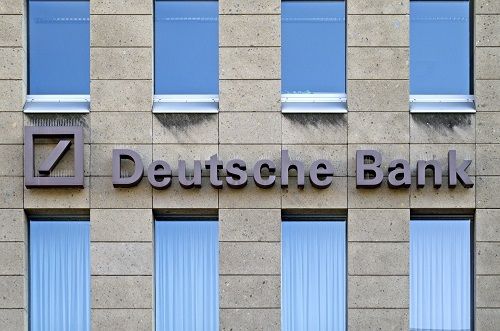Deutsche Bank, Germany’s largest lender, returned to profit in the third quarter, reporting a net income of €1.461 billion ($1.58 billion) attributable to shareholders.
This surpasses the €1.047 billion forecast by analysts polled by LSEG.
The bank’s Q3 performance marks a turnaround from a €143 million loss in the previous quarter, driven by improved litigation provisions and a strong revenue stream.
Amid challenging market conditions and declining interest rates, Deutsche Bank’s results reflect its strategic shift towards cost-saving measures and a renewed focus on shareholder returns.
Deutsche Bank Q3 revenue hits €7.5 billion
- Revenue reached €7.5 billion in Q3, exceeding the €7.338 billion anticipated by analysts.
- Profit before tax jumped 31% year-on-year to €2.26 billion.
- Provision for credit losses increased to €494 million, compared to €245 million a year ago.
- CET 1 capital ratio improved to 13.8%, up from 13.5% in Q2.
- Return on tangible equity (ROTE) rose to 10.2% from 7.3% year-over-year.
Cost-saving efforts key to Deutsche Bank’s Q3 recovery
Deutsche Bank’s profitability in Q3 is partly attributed to its ongoing cost-cutting program.
The bank aims to reduce its headcount by 3,500 roles by 2025, including 800 job cuts announced last year.
The savings initiative aligns with broader industry trends, as European banks adjust to a shifting interest rate environment.
Analysts suggest that further cost reductions will be essential to maintain competitive margins amidst softer market conditions.
The partial release of €440 million in litigation provisions during Q3 provided a significant boost to Deutsche Bank’s profit.
The provisions are tied to a long-running lawsuit over the bank’s acquisition of Postbank.
Notably, 60% of plaintiffs settled with Deutsche Bank in August, allowing the bank to pursue a stalled share repurchase plan.
This litigation relief has helped the bank navigate the financial impact of ongoing legal challenges.
Deutsche Bank distances itself from Commerzbank merger talks
Amid speculation of mergers within Germany’s banking sector, Deutsche Bank has moved away from a potential merger with Commerzbank.
The focus now shifts to Commerzbank’s possible acquisition by Italy’s Unicredit.
Market analysts view Deutsche Bank’s strategic direction as a signal of its intent to strengthen its position independently.
The decision highlights the bank’s focus on internal restructuring rather than pursuing inorganic growth through domestic consolidation.
European banks, including Deutsche Bank, have leaned on stock buybacks and dividend payouts to strengthen shareholder value in recent years.
With the European Central Bank’s shift to a looser monetary policy, banks now face pressure to deliver earnings growth in an environment of falling interest rates.
McKinsey’s Global Banking Annual Review 2024 warns that maintaining current ROTE levels will require European banks to cut costs approximately 2.5 times faster than revenue declines.
As Deutsche Bank eyes further growth, the pressure is on to adapt swiftly to these changing dynamics.
The post Deutsche Bank beat third-quarter expectations, but what drove the surge? appeared first on Invezz

